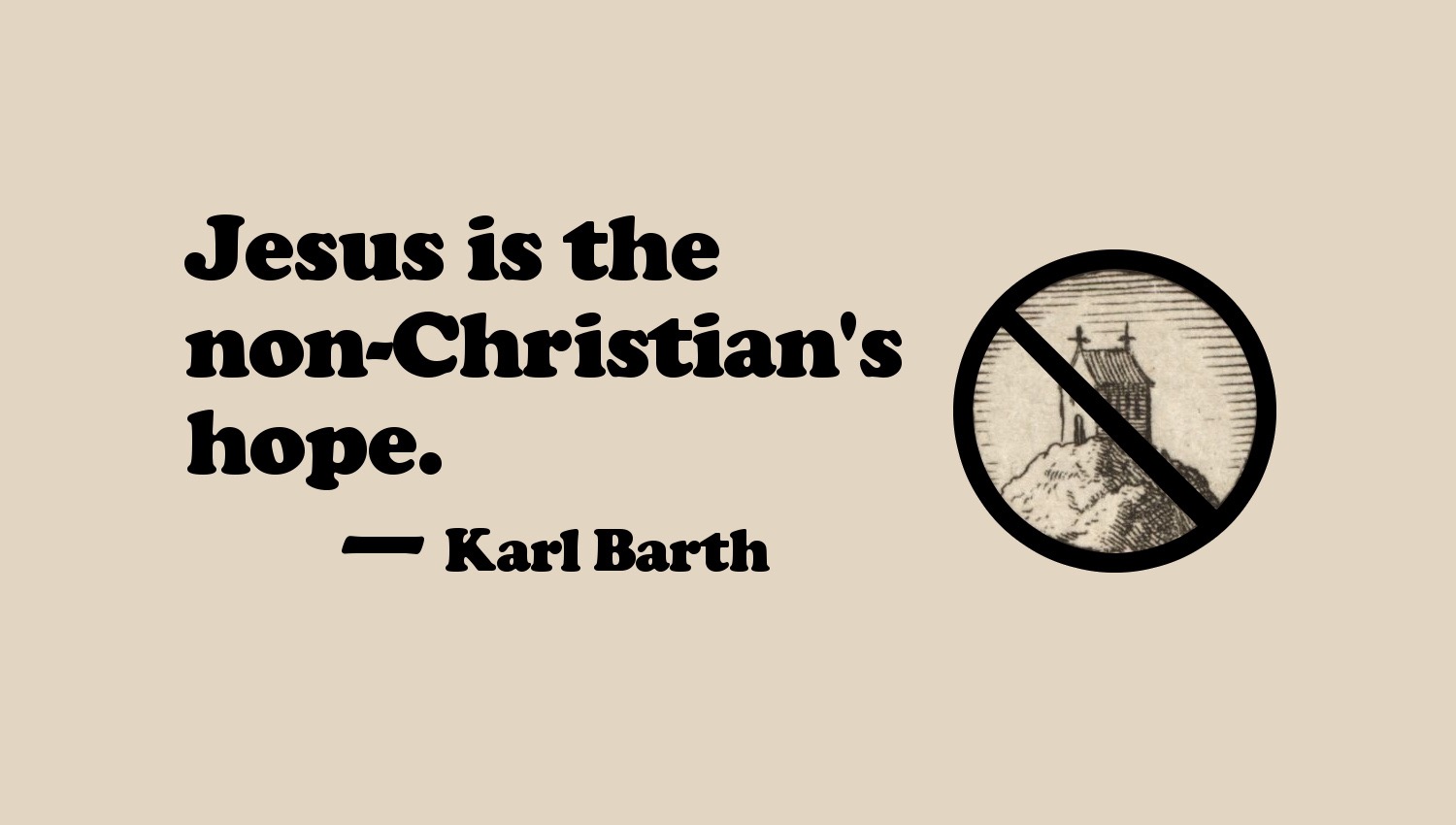
Jesus Christ is the Savior of all the World, especially those who believe (1 Tim 4:10), but not only those who believe, because non-Christians are included too! It is true that non-Christians do not have faith or hope in Jesus, but Jesus remains to be their hope, despite their disbelief (2 Tim 2:13). The grace of God is not limited to Christians alone (Matt 5:45), so the positive sign of life and the Lordship of Jesus should be extended to the non-Christian (and not limited to Christians alone). In the Church Dogmatics, Vol. IV/3.1, at the end of paragraph 69, Karl Barth explains that Jesus is specifically the hope of non-Christians, and may be a greater hope for non-Christians than Christians who already know Christ and his benefits (pace. Melanchthon).
All Christians were once non-Christians before their eyes were opened to Christ (as Barth describes conversion). All Christians have a time in their life, before they knew Jesus as their Savior, when their minds were darkened to Jesus, when they did not have faith or hope in Jesus, and it was precisely at this time that the Holy Spirit was at work in them, causing them to realize that Jesus is their Savior. The Holy Spirit's movement is as unpredictable as the wind. So we may never judge a non-Christian to be outside of salvation, because we are unable to discern how the power of the Holy Spirit is at work in non-Christians until they manifests belief.
Karl Barth explains that is by the power of the Holy Spirit that non-Christians exhibit many graces and gifts that are often unmatched by Christians in their charity and love for others. If the positive sign was not applied to non-Christians, then they would not be able to do any of these things (James 1:17). So we know that the power of the Holy Spirit is at work in these non-Christians by their fruitfulness (despite their lack of personal faith and hope in Jesus). Barth believes that the variation of gifts among non-Christians and lack-there-of in Christians, demonstrates that non-Christians may be more dearer to God than Christians.
Barth says that when a Christian judges someone to be a non-Christian, they are making a judgment that they cannot and should not make, because no one is able to discern that the Holy Spirit is not at work in others. Barth says that when we judge a person to be a non-Christian, we are actually calling our own Christianity into question, by declaring a person is non-Christian. The Christian fails to discern the Holy Spirits work in the person he judges to be a non-Christian, and this exposes the Christian's ability to discern the work of the Holy Spirit, even in himself, and reveals that this Christian may be deceived in thinking that he is in fact a Christian that he professes here and now.
Karl Barth explains why the positive sign of life and of the Lordship of Jesus is for the non-Christian and Christian alike, because Jesus is the Savior of all in this following long quotation. I've divided the quote into sections with italic headers for readability.
Jesus Christ is the hope of all people, and therefore of the non-Christian too.
Was it not necessary to relate the statement that Jesus Christ is here and now our hope, quite expressly to all men, and therefore also to non-Christians, to the heathen, to the theoretically or practically ungodly? How could we limit the positive sign of life in the midst of the times to Christians?
The main concern of the ongoing of the history of the prophecy of Jesus Christ which fills our time is with non-Christians. Their existence is a reminder of the darkness which resists it. It is for their sake that it must go forward, that Jesus Christ as the living Word of God is still on the way today. Their conversion from ignorance to knowledge, from unbelief to faith, from bondage to freedom, from night to day, is the goal of His prophetic work so far as it has a temporal goal. He wills to seek and to save those who are lost, who without Him, without the light of life, without the Word of the covenant, will necessarily perish. He is for them specifically, this light, this Word. He goes after them. He is their hope. The promise of the Spirit is for them. Why not? [1]
The non-Christian does not hope for Jesus, but Jesus is the hope for the non-Christian.
It is true that they are not for Him that which corresponds to what He is for them. They do not see Him as the light which shines for them. They do not hear what He has to say to them about what He has done for them. They do not know Him as He knows them. They do not take up the relationship which by His parousia (coming), presence and revelation is established and obtains between Him and them and them and Him.
On the contrary, they adopt in relation to Him an attitude of indifference, aversion and obstruction. But this cannot alter the fact that He is for them. As such, His relationship to them and theirs to Him is a fact which cannot be altered or removed. For it is established and created by the fact that, as the one He is, He lives in the midst of our time and takes the most direct way to them. Hence He is not merely their hope as well, but their hope specifically. [2]
All Christians were once non-Christians
Christians have many reasons to see this, in days past were not they themselves non-Christians, or sleeping and even dead Christians, and therefore in fact and at bottom non-Christians? Is it not the case that they were not for Him as He was for them? Have they not every cause to be grateful that in spite of this, without their response of love, indeed, even when they were enemies (Rom 5:10), He was for them, their hope, and the Holy Spirit was obviously promised to them in this way? Similarly, He is obviously promised in all His fullness to those who still confront them as non-Christians, Similarly, He is the hope of these others too. And supposing more importance is attached to those who are not yet Christians? [3]
God's grace often favors the non-Christian more than the Christian. Often we judge a Christian to be a non-Christian.
Supposing they are more interesting to Him than Christians in His will and action? Supposing the greater weight of His will and action falls in this sphere? Supposing His light shines brighter here, and His Word is more living and active? Supposing the unconverted are sometimes dearer to Him than the converted? Supposing the knowledge of Jesus Christ which divides Christians from non-Christians, when imparted to the latter, in fulfilment of the promise seriously given to the heathen too, brings forth among them more rich and varied and useful fruits than among those who already know Him, so that, the last are first and the first last? [4]
Often we think we are a Christian, but we are a non-Christian.
Supposing the Christian is deceived when he adjudges his fellow a non-Christian, because the knowledge of Jesus Christ has already found a lodging in him in a form which the Christian and perhaps the man himself does not recognise? Supposing, finally, the Christian is deceived as to his own Christianity, being more of a non-Christian than a Christian and basically perhaps not really being a Christian at all?
In face of all these by no means irrelevant questions the Christians should be glad that he lives under the lordship of Jesus Christ who is the hope even of those who are not for Him as He is for them, and under the promise, and in the power of the promise, which is also given to non-Christians of every kind. Remembrance of this should serve, not to diminish or restrict, but to increase and extend the gratitude, joy and responsibility with which the Christian may be such here and now under this positive sign and in accompaniment of the prophetic work of Jesus Christ, i.e., with which he may exist in the knowledge of Jesus Christ and as the recipient, bearer and possessor of the Spirit and of the lights, powers and gifts promised by Him. It is obvious that the positive sign under which our time and our life in this time stand means something more and different to him than it does to the non-Christian. [5]
References:
[^Header Image] Church Icon is from wikipedia: "Wenceslas Hollar woodcut" [Public domain], via Wikimedia Commons
[^1] Barth, Karl. Church Dogmatics: The Doctrine of Reconciliation, Vol IV/3.1. Trans. G. W. Bromiley. Vol. 27. London: T & T Clark, 2010. 348-9. Print. Study Edition. [364-5]
[^2] Ibid.
[^3] Ibid.
[^4] Ibid.
[^5] Ibid.




February 6th, 2017 - 19:28
One of my major pet peeves against people that use Barth to support particular theological positions is that I’ve found that he is often quoted without checking and confirming his ideas with Scripture itself. For instance, in support of ‘anonymous believers’ (K. Rahner’s term) you claim that “we know that the power of the Holy Spirit is at work in these non-Christians by their fruitfulness (despite their lack of personal faith and hope in Jesus)” However, in the Upper Room Discourse Jesus states that the world rejects both Him (John 15:24) and the Spirit (verse 14:17). Likewise, in my opinion, Barth, too, would be highly suspicious of ‘religious experience’ as the basis of truth claims. No one really wants to see sinful humanity full under the judgment of God, but giving people false hopes with pseudo-religious pragmatism and non-confessional theology, in both content and creed, is simply disastrous.
February 6th, 2017 - 19:45
Barth is not equivocal with Rahner here. Rahner’s Anonymous Christianity is within the rubric of his Jesuit theology. These evidences are not what causes salvation of non-Christians, according to Barth, but they are evidence that the positive sign of Jesus applies also to the non-Christian. The reformed creeds have always taught that god’s grace extends to the heathen. It’s not false hope, but true hope. Otherwise we are attributing the non-Christians graces to Satan, and that’s an error. Telling people who are under the positive sign that they are not Christians is far more dangerous.
June 13th, 2017 - 22:44
I am not saying Barth is necessarily wrong in everything he says. As a matter of fact I do think that there is scriptural support that the unbelievers can be sanctified by being close to believers. 1 Corinthians 7:14 “For the unbelieving husband is sanctified by the wife, and the unbelieving wife is sanctified by the husband: else were your children unclean; but now are they holy.”
With that said, we have to be extremely careful. Those that purposefully reject Christ or those men and women that would not marry a christian man or christian woman because of a hatred of Christ and Christians are lost and headed to hell unless they repent and believe. The need to call unbelievers to repentance is paramount. And Barth goes too far in stating that we should not call anybody a non-christian, or call anybody to repent of their sin and believe. If that were the case the gospel could not be preached as it should, by calling sinners to repentance.